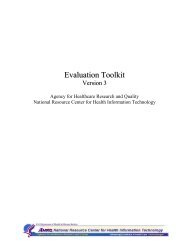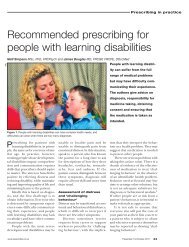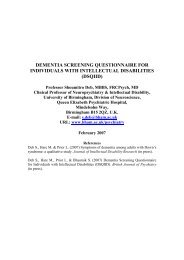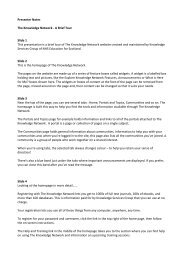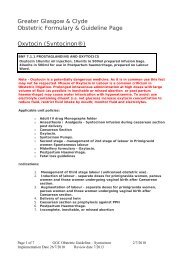The Fife Dementia Strategy: 2010 â 2020 - The Knowledge Network
The Fife Dementia Strategy: 2010 â 2020 - The Knowledge Network
The Fife Dementia Strategy: 2010 â 2020 - The Knowledge Network
You also want an ePaper? Increase the reach of your titles
YUMPU automatically turns print PDFs into web optimized ePapers that Google loves.
Bield Flexicare<br />
Is a specialist service designed to meet the needs of older people with<br />
dementia living at home who would benefit from getting support to<br />
maintain daily living skills, support their lifestyle choices and be involved in<br />
accessing their local community. It also provides support to the carers of<br />
users of the service. <strong>The</strong> service is an enabling service to support people<br />
with dementia to maintain the skills required to continue living at home or<br />
in the home of their carer. <strong>The</strong> service was established in 1991 and now<br />
covers most of <strong>Fife</strong>. Flexicare receives funding from both the <strong>Fife</strong> Council<br />
and NHS <strong>Fife</strong>. <strong>The</strong> service is needs led and operates 7 days a week, 365<br />
days a year. As the service is built around the individual - it is provided at<br />
a time to meet the needs of the service user and their carer. Service users<br />
are allocated a flexicare worker and partner worker to provide consistency<br />
of care and support for the service user and their carer allowing trusting<br />
relationships to be built.<br />
used to ease the transition into long term care if necessary. <strong>The</strong> provision of<br />
high-quality and flexible services may also positively impact the lives of people<br />
with dementia in many ways including: promoting and maintaining<br />
independence, supporting carers, reducing social isolation, and preventing<br />
admission to hospitals and care homes 39 .<br />
Currently care at home providers in <strong>Fife</strong> strive to offer a high quality service to<br />
people who have a range of needs, this include health and social care<br />
services. However, service providers face challenges in responding to the<br />
demand placed upon them as the number of people requiring support at home<br />
continues to increase; this is thought to be leading to the provision of taskfocused<br />
home care which does not meet a number of the basic principles of<br />
care that people, especially those with dementia, need. Services must be able<br />
to work with and apply the principles of flexible person centred care integrated<br />
into a culture of skill maintenance and reablement 40 . In the years to come<br />
there will be an increase in the number of individuals with a learning disability<br />
and dementia as well as alcohol related dementia. Many of these people may<br />
be under the age of 65 and have unique needs which are rarely met by<br />
traditional older persons care services or those for people with a learning<br />
disability. <strong>The</strong>y require more flexible and adaptive services with staff that are<br />
skilled in working with people with such unique and often complex needs.<br />
Care at home services must be comprehensive in their scope and able to<br />
provide the following:<br />
• Carer and service user involvement in decision making processes;<br />
• Staff who have dementia care training;<br />
• Specialist staff with in-depth dementia care training;<br />
• 24 hour intensive support;<br />
39 Commission for Social Care Inspection (2006). Time to Care? <strong>The</strong> Stationary Office:<br />
London<br />
40 Reablement refers to models of care which support the active process of regaining skills,<br />
confidence and independence. <strong>The</strong>y are generally short-term services with intensive in-put.<br />
50




